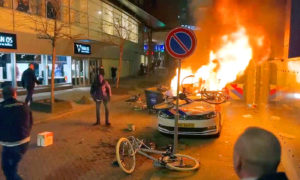Nestled in the green countryside far from the power and bustle of The Hague sits a bright, pink farmhouse. This 157-year-old Grade-A-listed building in Drieborg is not allowed to be Barbie pink. Painting it was a protest, a sign that inside the walls of the Dutch province of Groningen — perched above Europe’s biggest gas field — all is not well.
“We did it out of despair,” says Annemarie Nijhoff, who lives there with her partner Boelo ten Have. “That’s why we painted the farmhouse pink. It has been in the family for generations, carefully maintained. But for the last 10 years, it has been cracking so fast that we cannot repair it. Every time we report damage, we are told we are outside the earthquake zone.
“We believe it is a result of mine-related damage. We can’t pull it down because it’s a national monument. So we are completely stuck.”
Theirs is a common tale. This northernmost Dutch province has seen more than a million reports of damage since 1986, due to decades of earthquakes caused by 60 years of gas exploitation. In the process of emptying fourth-fifths of a field that contained 2,800 billion cubic metres of gas, the Dutch state has earned the equivalent of €417 billion. Its partner the Nederlandse Aardolie Maatschappij (NAM) — owned by Shell and ExxonMobil — has taken the equivalent of €64.7 billion, according to figures seen by the Financieele Dagblad.
But what is most shocking is what has gone on behind closed doors: a succession of secret deals and convenient political myopia that are slowly being exposed in a ground-shaking parliamentary enquiry being televised across the country.
When the gas field was discovered and the first well was drilled in 1959, it was a gift to the once Nazi-occupied and war-torn country. But as the decades wore on, alarming signals of seismic activity, earthquakes and damage to buildings were dismissed, belittled and ignored by central government, which needed both the gas and the cash from exports.
Slowly, inexorably, press coverage and public outrage started to swell until, in early 2021, parliament voted to install its ultimate weapon of scrutiny: an enquiry to examine politicians, oil and gas executives, mining experts, residents and even schoolchildren who found themselves living in temporary homes with earthquake-proofed beds, as their families fell apart.
Now in its fourth week of hearings, the enquiry has uncovered political ignorance, secret lobbying, and agreements with NAM to avoid reducing production to strictly necessary levels. It also exposed a brazen admission by the former finance minister that, especially after the financial crash, the Treasury couldn’t do without the gas cash. Even though earthquakes were worsening and by 2015 the high court ordered non-essential extraction to stop, it did not.
Today, as a result, at a moment of Europe-wide energy insecurity, much-needed Dutch gas is no longer a political option, even if up to 20% of the field is still there. Thanks to tin-eared politicians and slippery oil firms, we are as vulnerable as the rest of Europe. Indeed, a week after Liz Truss removed a ban on unconventional fracking for shale gas in the UK (which is prohibited in the Netherlands), the Dutch experience might be seen as a lesson for politicians to listen and tread carefully.
In the beginning, the gas was welcome. “Straight after the Second World War, industry and government worked very closely to rebuild the Netherlands and extracting the gas for the benefit of the people at that time was a good thing,” says Liesbeth van Tongeren, Green Left politician and former director of Greenpeace Nederlands, who campaigned as an MP to reduce gas extraction from Groningen. Rather than build a sovereign wealth fund like Norway, the gas boosted the annual budget for the state, especially in later years.
But then, in 1986, the earthquakes began to start. The worst didn’t take place until August 2012, in Huizinge: it measured 3.6 on the Richter scale, but because of its relatively shallow depth (compared to natural earthquakes), it caused extensive damage and a cataclysmic feeling of shock.
By 2013, Groningen province was campaigning for expert research into the risks and compensation for damage. Yet somehow, that same year, gas extraction rose from 27 billion cubic metres to almost 54 billion, with the NAM advocating for more. The years that followed involved high court rulings, political promises to “stop the gas tap” and three different bodies charged with compensating owners and strengthening buildings.
But on the ground, the tremors were trivialised, partly because nobody died or was seriously injured as a direct result. “The Hague had the feeling that this was very far away,” says Van Tongeren. “If anything like that earthquake had happened in Amsterdam, it would have been dealt with completely differently. It was easier to ignore.”
Fast forward to today, however, and pledges to stop extracting gas from the field remain unfulfilled. Like every country in Europe, the Netherlands is scrambling to create more processing facilities for Liquefied Natural Gas. Any political debate about increasing this year’s 2.8 billion cubic metres of gas is unlikely to go anywhere. The government is promising to close the Groningen field entirely in 2023 or 2024, but only “if the geopolitical situation makes it possible”.
Meanwhile, Groningers are left angry and bewildered. What they are hearing in the enquiry reaffirms their suspicions over the years, the sense of being taken for fools, and a justification for all of their mistrust. “Some people think it’s all very well to have a parliamentary enquiry but that it won’t solve today’s problem,” Coert Fossen, chair of the Groninger Bodem Beweging (Groningen Ground Movement), tells me.
Another reason for their frustration is the fact that many have had to fight for every euro of compensation. Another historic house in Groningen has just been painted protest pink, an estimated 13,000 homes are still unsafe, and tens of thousands of claims have been rejected.
Fabian Buiter, a financial controller from Beerta, probably heard the most outrageous excuse from the Instituut Mijnbouwschade Groningen (IMG) now handling claims. An inspector said splits in his bathroom tiles masking €30,000 of damage were due to poor quality fittings and the soap he used in the shower. He lives on the edge of the official “contour lines” and after a failed court case, paid for the damage himself. He might even laugh about the soap-dodgers, if the whole thing didn’t make him want to cry.
Small wonder, then, that these down-to-earth Groningers, who are more used to ploughing the fields and keeping themselves to themselves, have lost trust in their government. For them, the political damage is done; and even when the gas stops, the earthquakes will continue for decades.
Some in The Hague put their hope in a strong enquiry report next February, leading to the creation of an independent arbiter that can control and effectively regulate fossil fuel extraction in the future. Others believe the situation will help speed up a transition to renewable energy. The danger is that despite the efforts of earnest parliamentarians, this scandal, like all the others in The Hague, will soon be written up, written off, and a part of fading memory. But in this corner of the Netherlands, the aftershock will remain.
Disclaimer
Some of the posts we share are controversial and we do not necessarily agree with them in the whole extend. Sometimes we agree with the content or part of it but we do not agree with the narration or language. Nevertheless we find them somehow interesting, valuable and/or informative or we share them, because we strongly believe in freedom of speech, free press and journalism. We strongly encourage you to have a critical approach to all the content, do your own research and analysis to build your own opinion.
We would be glad to have your feedback.
Source: UnHerd Read the original article here: https://unherd.com/



